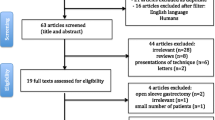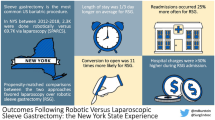Abstract
Introduction
Sleeve gastrectomy has gained popularity over the past decade due to its safety, feasibility, and good results. The purpose of this study is to describe our results, both short and long term, with this procedure.
Material and Methods
This study is a nonrandomized, controlled, retrospective review of 409 patients who underwent a minimally invasive sleeve gastrectomy at the University of Illinois Hospital and Health System from January 2008 to December 2013. A total of 304 patients underwent a laparoscopic sleeve gastrectomy, and another 105 patients underwent a robotic procedure using the da Vinci Surgical System®. Patient demographics, comorbidities, date of surgery, postoperative morbidity and mortality, operating time, length of stay, and excess weight loss were reviewed.
Results
The mean age was 41 years (18–70) with no statistical difference between the two groups. Patient’s demographics were similar (p = 0.395) in both groups. The mean operative time for the robotic group was 110.6 versus 84.18 min in the laparoscopic group, which was statistically significant (p < 0.05). There were no significant differences between the two groups with regard to the perioperative complications, length of stay, or % excess weight loss.
Conclusion
There is no significant difference between the robotic and laparoscopic group in terms of complications, length of stay, and estimated blood loss. Robot-assisted sleeve gastrectomy is associated with longer operative time and increased cost.



Similar content being viewed by others
References
Gill TP, Antipatis VJ, James WP. The global epidemic of obesity. Asia Pac J Clin Nutr. 1999;8(1):75–81.
Kelly T, Yang W, Chen CS, et al. Global burden of obesity in 2005 and projections to 2030. Int J Obes (Lond). 2008;32(9):1431–7.
Ogden CL, Carroll MD, Kit BK, et al. Prevalence of obesity among adults: United States, 2011–2012. NCHS Data Brief. 2013;(131):1–8.
Chopra A, Chao E, Etkin Y, et al. Laparoscopic sleeve gastrectomy for obesity: can it be considered a definitive procedure? Surg Endosc. 2012;26(3):831–7.
Rosenthal RJ, International Sleeve Gastrectomy Expert Panel, Diaz AA, et al. International Sleeve Gastrectomy Expert Panel Consensus Statement: best practice guidelines based on experience of >12,000 cases. Surg Obes Relat Dis. 2012;8(1):8–19.
Kashyap SR, Gatmaitan P, Brethauer S, et al. Bariatric surgery for type 2 diabetes: weighing the impact for obese patients. Cleve Clin J Med. 2010;77(7):468–76.
Fischer L, Hildebrandt C, Bruckner T, et al. Excessive weight loss after sleeve gastrectomy: a systematic review. Obes Surg. 2012;22(5):721–31.
Sjöström L, Lindroos AK, Peltonen M, et al. Lifestyle, diabetes, and cardiovascular risk factors 10 years after bariatric surgery. N Engl J Med. 2004;351(26):2683–93.
Langeveld M, de Vries JH. [The mediocre results of dieting]. Ned Tijdschr Geneeskd. 2013;157(29):A6017.
Switzer NJ, Mangat HS, Karmali S. Current trends in obesity: body composition assessment, weight regulation, and emerging techniques in managing severe obesity. J Interv Gastroenterol. 2013;3(1):34–6.
Amorim Adegboye AR, Linne YM. Diet or exercise, or both, for weight reduction in women after childbirth. Cochrane Database Syst Rev. 2013;7, CD005627.
Yanovski SZ, Yanovski JA. Long-term drug treatment for obesity: a systematic and clinical review. JAMA. 2014;311(1):74–86.
Kissler HJ, Settmacher U. Bariatric surgery to treat obesity. Semin Nephrol. 2013;33(1):75–89.
Gloy VL, Briel M, Bhatt DL, et al. Bariatric surgery versus non-surgical treatment for obesity: a systematic review and meta-analysis of randomised controlled trials. BMJ. 2013;347:f5934.
Ayloo S, Buchs NC, Addeo P, et al. Robot-assisted sleeve gastrectomy for super-morbidly obese patients. J Laparoendosc Adv Surg Tech A. 2011;21(4):295–9.
Elli EF, Masrur MA, Giulianotti PC. Robotic sleeve gastrectomy after liver transplantation. Surg Obes Relat Dis. 2013;9(1):e20–2.
Sammour T, Hill AG, Singh P, et al. Laparoscopic sleeve gastrectomy as a single-stage bariatric procedure. Obes Surg. 2010;20(3):271–5.
Mognol P, Chosidow D, Marmuse JP. Laparoscopic sleeve gastrectomy (LSG): review of a new bariatric procedure and initial results. Surg Technol Int. 2006;15:47–52.
Guzmán S, Manrique M, Raddatz A, et al. Results of bariatric surgery. Experience over 18 years. Rev Med Chil. 2013;141(5):553–61.
Peterli R, Borbély Y, Kern B, et al. Early results of the Swiss Multicentre Bypass or Sleeve Study (SM-BOSS): a prospective randomized trial comparing laparoscopic sleeve gastrectomy and Roux-en-Y gastric bypass. Ann Surg. 2013;258(5):690–5.
Daskalakis M, Weiner RA. Sleeve gastrectomy as a single-stage bariatric operation: indications and limitations. Obes Facts. 2009;2 Suppl 1:8–10.
Sabbagh C, Verhaeghe P, Dhahri A, et al. Two-year results on morbidity, weight loss and quality of life of sleeve gastrectomy as first procedure, sleeve gastrectomy after failure of gastric banding and gastric banding. Obes Surg. 2010;20(6):679–84.
Quesada BM, Roff HE, Kohan G, et al. Laparoscopic sleeve gastrectomy as an alternative to gastric bypass in patients with multiple intraabdominal adhesions. Obes Surg. 2008;18(5):566–8.
Sánchez-Santos R, Ruiz de Gordejuela AG, Gómez N, et al. [Factors associated with morbidity and mortality after gastric bypass. Alternatives for risk reduction: sleeve gastrectomy]. Cir Esp. 2006;80(2):90–5.
Vidal P, Ramón JM, Goday A, et al. Laparoscopic gastric bypass versus laparoscopic sleeve gastrectomy as a definitive surgical procedure for morbid obesity. Mid-term results. Obes Surg. 2013;23(3):292–9.
Mittermair R, Sucher R, Perathoner A. Results and complications after laparoscopic sleeve gastrectomy. Surg Today. 2013.
Rawlins L, Rawlins MP, Brown CC, et al. Sleeve gastrectomy: 5-year outcomes of a single institution. Surg Obes Relat Dis. 2013;9(1):21–5.
Giulianotti PC, Addeo P, Buchs NC, et al. Robotic extended pancreatectomy with vascular resection for locally advanced pancreatic tumors. Pancreas. 2011;40(8):1264–70.
Milone L, Daskalaki D, Fernandes E, et al. State of the art in robotic hepatobiliary surgery. World J Surg. 2013;37(12):2747–55.
Horgan S, Galvani C, Gorodner MV, et al. Robotic-assisted Heller myotomy versus laparoscopic Heller myotomy for the treatment of esophageal achalasia: multicenter study. J Gastrointest Surg. 2005;9(8):1020–9. discussion 1029–30.
Buchs NC, Pugin F, Azagury DE, et al. Robotic revisional bariatric surgery: a comparative study with laparoscopic and open surgery. Int J Med Robot. 2013. doi:10.1002/rcs.1549.
Sudan R, Puri V, Sudan D. Robotically assisted biliary pancreatic diversion with a duodenal switch: a new technique. Surg Endosc. 2007;21(5):729–33.
Ayloo SM, Addeo P, Buchs NC, et al. Robot-assisted versus laparoscopic Roux-en-Y gastric bypass: is there a difference in outcomes? World J Surg. 2011;35(3):637–42.
Snyder BE, Wilson T, Leong BY, et al. Robotic-assisted Roux-en-Y Gastric bypass: minimizing morbidity and mortality. Obes Surg. 2010;20(3):265–70.
Ayloo SM, Addeo P, Shah G, et al. Robot-assisted hybrid laparoscopic Roux-en-Y gastric bypass: surgical technique and early outcomes. J Laparoendosc Adv Surg Tech A. 2010;20(10):847–50.
Tieu K, Allison N, Snyder B, et al. Robotic-assisted Roux-en-Y gastric bypass: update from 2 high-volume centers. Surg Obes Relat Dis. 2013;9(2):284–8.
Romero RJ, Kosanovic R, Rabaza JR, et al. Robotic sleeve gastrectomy: experience of 134 cases and comparison with a systematic review of the laparoscopic approach. Obes Surg. 2013;23(11):1743–52.
Hagen ME, Pugin F, Chassot G, et al. Reducing cost of surgery by avoiding complications: the model of robotic Roux-en-Y gastric bypass. Obes Surg. 2012;22(1):52–61.
Must A, Spadano J, Coakley EH, et al. The disease burden associated with overweight and obesity. JAMA. 1999;282(16):1523–9.
Myers SR, McGuirl J, Wang J. Robot-assisted versus laparoscopic gastric bypass: comparison of short-term outcomes. Obes Surg. 2013;23(4):467–73.
Cirocchi R, Boselli C, Santoro A, et al. Current status of robotic bariatric surgery: a systematic review. BMC Surg. 2013;13(1):53.
Diamantis T, Alexandrou A, Nikiteas N, et al. Initial experience with robotic sleeve gastrectomy for morbid obesity. Obes Surg. 2011;21(8):1172–9.
Vilallonga R, Fort JM, Caubet E, et al. Robotic sleeve gastrectomy versus laparoscopic sleeve gastrectomy: a comparative study with 200 patients. Obes Surg. 2013;23(10):1501–7.
Trastulli S, Desiderio J, Guarino S, et al. Laparoscopic sleeve gastrectomy compared with other bariatric surgical procedures: a systematic review of randomized trials. Surg Obes Relat Dis. 2013;9(5):816–29.
Che F, Nguyen B, Cohen A, et al. Prevalence of hiatal hernia in the morbidly obese. Surg Obes Relat Dis. 2013;9(6):920–4. doi:10.1016/j.soard.2013.03.013.
Daes J, Jimenez ME, Said N, et al. Laparoscopic sleeve gastrectomy: symptoms of gastroesophageal reflux can be reduced by changes in surgical technique. Obes Surg. 2012;22(12):1874–9.
Soricelli E, Casella G, Rizzello M, et al. Initial experience with laparoscopic crural closure in the management of hiatal hernia in obese patients undergoing sleeve gastrectomy. Obes Surg. 2010;20(8):1149–53.
Korwar V, Peters M, Adjepong S, et al. Laparoscopic hiatus hernia repair and simultaneous sleeve gastrectomy: a novel approach in the treatment of gastroesophageal reflux disease associated with morbid obesity. J Laparoendosc Adv Surg Tech A. 2009;19(6):761–3.
Abdalla RZ, Garcia RB, Luca CR, et al. Brazilian experience in obesity surgery robot-assisted. Arq Bras Cir Dig. 2012;25(1):33–5.
Yuval JB, Mintz Y, Cohen MJ, et al. The effects of bougie caliber on leaks and excess weight loss following laparoscopic sleeve gastrectomy. Is there an ideal bougie size? Obes Surg. 2013;23(10):1685–91.
Parikh M, Issa R, McCrillis A, et al. Surgical strategies that may decrease leak after laparoscopic sleeve gastrectomy: a systematic review and meta-analysis of 9991 cases. Ann Surg. 2013;257(2):231–7.
Markar SR, Penna M, Hashemi M. Robotic bariatric surgery: bypass, band and sleeve. Where are we now? And what is the future? Minerva Gastroenterol Dietol. 2012;58(3):181–90.
Acknowledgments
We thank our bariatric research team for guidance and patience.
Conflict of Interest
No grant funding was obtained for this study. The authors declare that they have no conflict of interest pertinent to the study.
Statement of Informed Consent
Informed consent for surgery was obtained from all individual participants included in the study before they underwent the procedure. As this is a retrospective analysis, formal consent is not required and an exempt application was approved by Institutional Review Board.
Statement of Human Rights
For this type of retrospective study, formal consent is not required and an exempt application was approved by Institutional Review Board.
Author information
Authors and Affiliations
Corresponding author
Rights and permissions
About this article
Cite this article
Elli, E., Gonzalez-Heredia, R., Sarvepalli, S. et al. Laparoscopic and Robotic Sleeve Gastrectomy: Short- and Long-Term Results. OBES SURG 25, 967–974 (2015). https://doi.org/10.1007/s11695-014-1499-0
Published:
Issue Date:
DOI: https://doi.org/10.1007/s11695-014-1499-0




